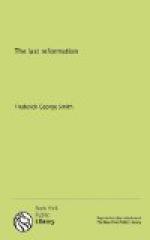[Sidenote: Ministerial oversight]
The apostles were the first to whom Christ delegated authority. They became his special representatives. They established the church and became responsible for its general direction and oversight, “the Lord working with them, and confirming the word with signs following” (Mark 16:20). But these twelve did not stand alone in the government of the church. Soon a host of ministers were raised up, and these also possessed divine authority for their representative lines of work. To the elders of Ephesus, Paul said, “Take heed therefore unto yourselves, and to all the flock, over which the Holy Ghost hath made you overseers, to feed the church of God” (Acts 20:28). Peter also writes: “The elders which are among you I exhort ... feed the flock of God which is among you, taking the oversight thereof” (1 Pet. 5:1, 2). “The Holy Ghost said, Separate me Barnabas and Saul for the work whereunto I have called them ... so they, being sent forth by the Holy Ghost, departed” (Acts 13: 2-4). “AND HE GAVE some, apostles; and some, prophets; and some, evangelists; and some, pastors and teachers; for the perfecting of the saints, for the work of the ministry, for the edifying of the body of Christ” (Eph. 4:11, 12). In accordance with this standard, we read, “Obey them that have the rule over you, and submit yourselves: for they watch for your souls, as they that must give account” to him who is “that great shepherd of the sheep” (Heb. 13:17, 20). The ministers were under-shepherds appointed to feed the flock of God, for which service they had to give account to the great Shepherd.
The foregoing scriptures and many others show conclusively that, while in the apostolic church spiritual oversight was, in general, vested in the ministry, it did not originate with them; that it did not proceed from the general body of believers by a majority vote or by conference appointment; but that it came by the Holy Spirit direct from the great head of the church, who alone determined the general bounds of that authority and responsibility. This ministry, or presbytery, consisted of two classes—local ministers and general ministers. Before proceeding from this general classification to a discussion of the more specific duties and responsibilities of the individual ministers comprising this presbytery, I shall call attention briefly to the geographical distribution of their work as a body.
[Sidenote: Local and general phase]
We have already shown that the church in its visible phase was made up of various local congregations “set in order” by apostolic authority. So far as their own local affairs were concerned, these congregations were autonomous. When a matter was purely local, such as the financial oversight and ministration in the church at Jerusalem, the local congregation itself determined the course of action and (excepting that class of officials who were divinely chosen) who should be appointed to oversee it. In the Jerusalem example cited, the apostles suggested, “Look ye out among you seven men,” etc., “and the saying pleased the whole multitude: and they chose” the proper persons for that work (Acts 6:1-5).




